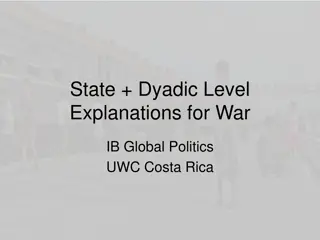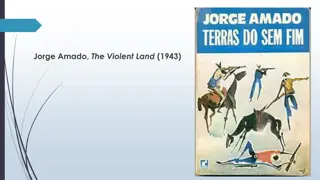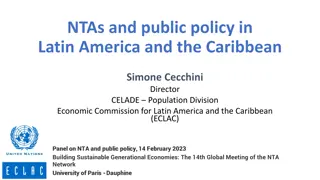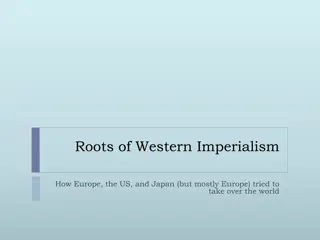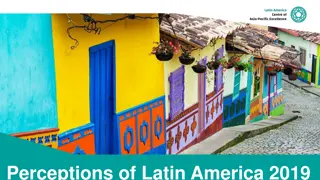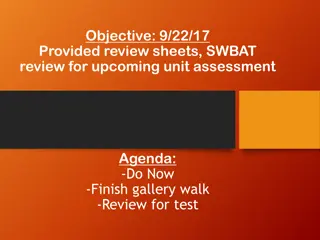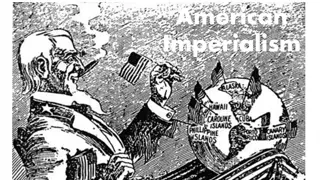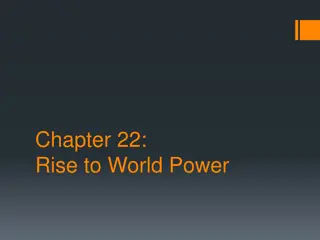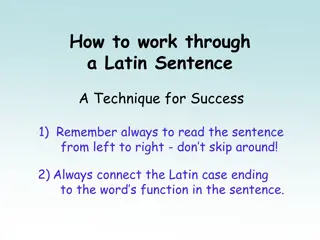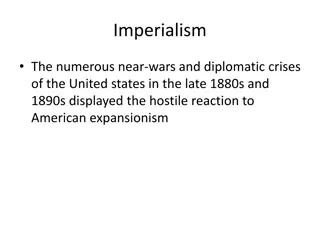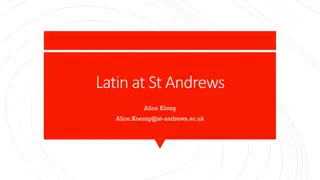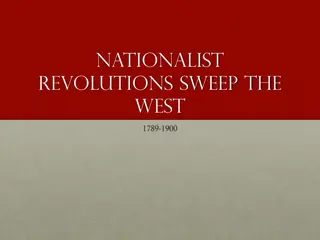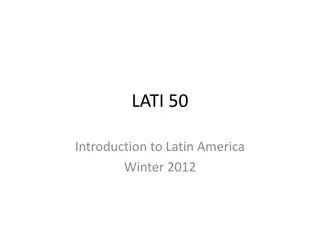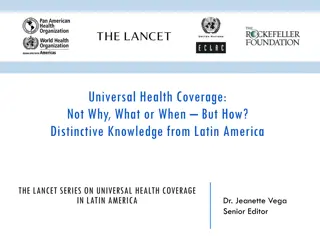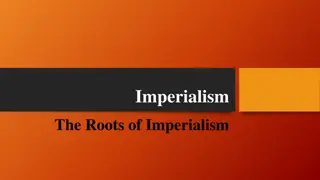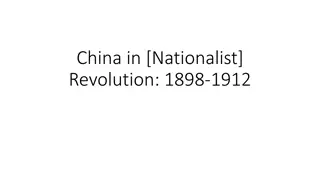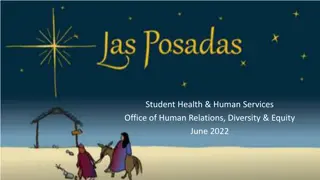United States Imperialism in Latin America
United States' involvement in Latin America, particularly in Puerto Rico and Cuba, post-Spanish-American War, showcased a shift towards imperialism. Policies such as the Foraker Act and the Platt Amendment highlighted American efforts to exert influence in the region, leading to mixed reactions from the local populations. Theodore Roosevelt's Big Stick Diplomacy further exemplified the US approach to foreign relations during this period.
Download Presentation

Please find below an Image/Link to download the presentation.
The content on the website is provided AS IS for your information and personal use only. It may not be sold, licensed, or shared on other websites without obtaining consent from the author.If you encounter any issues during the download, it is possible that the publisher has removed the file from their server.
You are allowed to download the files provided on this website for personal or commercial use, subject to the condition that they are used lawfully. All files are the property of their respective owners.
The content on the website is provided AS IS for your information and personal use only. It may not be sold, licensed, or shared on other websites without obtaining consent from the author.
E N D
Presentation Transcript
Imperialism The United States and Latin America
Policy in Puerto Rico and Cuba Americans began calling for a more aggressive role in Latin America American leaders viewed Latin America as being a sphere of influence for the US and foreign nations should stay out US influence in Latin America brought benefits to the US but contributed to anti-American hostility
Policy in Puerto Rico and Cuba After the Spanish-American War, Puerto Rico remained under direct US military rule In 1900, Congress passed the Foraker Act establishing a civil government in Puerto Rico
The Foraker Act Act authorized the President to appoint a governor and part of the Puerto Rican legislature Puerto Ricans could fill the rest of the legislature in a general election Citizenship rights for Puerto Ricans remained unclear and eventually the Supreme Court ruled Puerto Ricans did not enjoy the same rights as Americans
The Platt Amendment Though the Treaty of Paris granted Cuba independence, the US Army did not leave the island until 1902 US Congress forced Cuba to add the Platt Amendment to its constitution bringing the country under the US sphere of influence
The Platt Amendment Prevented Cuba from signing a treaty with another nation without American approval Required Cuba to lease naval stations to the US and granted the US the right to intervene to preserve order in Cuba Cubans strongly disliked the Platt Amendment, but realized the US would not end its military government of the island and added the amendment to their constitution
Big Stick Diplomacy When Theodore Roosevelt became President, he promoted a new kind of diplomacy based on a strong military to achieve America s goals called big stick diplomacy Based on Roosevelt s admiration for old African saying, Speak softly and carry a big stick; you will go far
Big Stick Diplomacy Roosevelt believed in carrying a big stick due to his adherence to balance-of-power principles and his view of the US as a special nation with a moral responsibility to civilize weaker nations Believed Americas elite had to accept the challenge of international leadership
The Panama Canal Roosevelt was not the source of the idea to build a canal across Central America, but did play a significant role in its history In 1903, the US bought the rights to build a canal across Panama from a French company for $40 million
The Panama Canal Before the US could build a canal through Panama, the US needed the consent of the Columbian government At the time, Panama was apart of Columbia Columbia demanded more than the US was willing to provide and negotiations stalled
The Panama Canal Roosevelt stepped in and sent US warships to support a Panamanian rebellion against Columbia US Navy presence convinced the Columbians not to interfere and Panama soon declared independence Panama granted US control over the Canal Zone and 35,000 workers began construction of the canal
The Panama Canal Although doctors did develop scientific breakthroughs to combat tropical diseases, 5,000 workers still died constructing the canal Canal finally completed in 1914, cutting 8,000 nautical miles off the trip from the east coast to the west coast of the United States
The Roosevelt Corollary Early 1900s: Possibility of European intervention in Latin America presented due to Latin American countries to repay debts 1903: Germany and Britain blockaded Venezuelan ports to ensure the country repaid European debts
The Roosevelt Corollary 1904: Roosevelt announced to Congress a new Latin America policy The President s Roosevelt Corollary updated the Monroe Doctrine for an age of economic imperialism
The Roosevelt Corollary The Corollary stated that the US will intervene in cases of chronic wrongdoing by Latin American nations that European nations may use to justify military intervention US would assume police power and restore order, depriving European nations the excuse of intervening Used to reassert America s longstanding policy of keeping Western Hemisphere free from European intervention
Tafts Dollar Diplomacy When his term was over, Roosevelt picked William Howard Taft to succeed him as President After winning the election, Taft wished to maintain open door policy in Asia and ensure continued stability in Latin America
Tafts Dollar Diplomacy Taft hoped to calm anti-American feelings in Asia and Latin America by relying less on the big stick and more on dollar diplomacy Policy aimed to increase American investments in businesses and banks throughout Central America and the Caribbean Americans invested in plantations, mines, oil wells, etc. Still required military intervention: 1909 & 1912 Nicaragua
Wilson & Moral Diplomacy During the election of 1912, Wilson criticized the foreign policy of Roosevelt and Taft After winning the election, Wilson appointed William Jennings Bryan as Secretary of State Wanted to take US foreign policy in a different direction
Wilson & Moral Diplomacy Wilson promised that the US would no longer seek new territories, but would seek to promote human rights, national integrity, and opportunity called Moral Diplomacy Despite his preference for moral diplomacy, Wilson did use military to guide Latin Americans in the direction he though proper
Wilson & Moral Diplomacy 1915: Wilson sends troops to Haiti to protect US interests and guard against the potential of German or French aggression in the nation Wilson prodded Hattian government to sign agreement giving US right to control its financial and foreign affairs
Revolution in Mexico For years, Mexican dictator Porfirio Diaz benefited his country s small upper class of wealthy landowners, clerics, and military men Diaz encouraged foreign investment resulting in American business people owning large portions of Mexico s industries
Revolution in Mexico Mexican aristocracy and foreign investor's wealth grew while its large population suffered 1911: Francisco Madero led the Mexican Revolution that toppled Diaz, but he was later overthrown due to his lack of administration skills Wilson could not accept new leader General Victoriano Huerta and instead backed Venustiano Carranza
Wilson Sends In Troops 1914: Wilson uses US sailors arrests to help Carranza Wilson sent Marines to occupy Veracruz, which caused the Huerta government to collapse Carranza government was slow to bring about reforms, causing rebels to rise up under Francisco Pancho Villa
Wilson Sends In Troops 1916: Villa s forces crossed over border into New Mexico, raiding the town of Columbus, leaving 18 dead Wilson sent General John J. Pershing and 10,000 soldiers to Mexico to chase Villa Pershing chased him for several months, failing to capture him
Wilson Sends In Troops 1917: Due to his concerns of World War I in Europe, Wilson eventually withdraws American troops from Mexico Not long afterward, US declared war on Germany and General Pershing would lead the American Expeditionary Force in Europe





